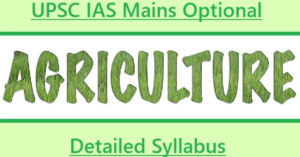UPSC Agriculture Optional Question Paper, UPSC Agriculture Optional Syllabus, UPSC Previous Year Question Papers, Last 15 Years PYQ’s, Why Choose Agriculture as an Optional Subject?, Preparation Strategy, Key Resources, 15 Years UPSC Agriculture Optional Question Paper
Introduction
The Union Public Service Commission (UPSC) Civil Services Examination is one of India’s most prestigious and challenging competitive exams. Aspiring civil servants aim to crack the mains examination, which consists of nine papers, one of which is the optional subject paper. For candidates with a background or interest in agriculture, choosing Agriculture as their optional subject can be a strategic decision. This article tells about the UPSC Agriculture Optional Question Paper, providing insights into its significance, preparation strategies, and key resources.

Why Choose Agriculture as an Optional Subject?
- Personal Interest and Background: If you have a genuine passion for agriculture or a background in this field, opting for Agriculture as your optional subject can play to your strengths.
- Scoring Potential: Agriculture is known for its high scoring potential in the UPSC Mains. The questions are generally straightforward, and there is less room for subjectivity in evaluation.
- Interdisciplinary Nature: Agriculture intersects with various subjects like economics, geography, and environmental science, allowing you to integrate your knowledge across different fields.
- Relevance: Agriculture is a crucial sector in India’s economy, and understanding it is essential for any aspiring civil servant. This knowledge can be beneficial in policy-making and administration roles.
- Ample Study Material: There is a plethora of study material available for the UPSC Agriculture Optional Exam.
Join Our WhatsApp Group for latest information’s and all Competitive Exams Previous Year Question Papers:- WhatsApp Group
Understanding the UPSC Mains Agriculture Optional Syllabus:
Before starting the preparation, it is crucial to understand the syllabus. The Agriculture Optional paper consists of two papers (Paper-I and Paper-II), each carrying 250 marks. Here’s an overview of the syllabus:
Syllabus Breakdown:
The UPSC Mains Agriculture Optional syllabus is extensive but well-structured. It covers a wide range of topics, including:
- Crop Production and Management
- Soil Science
- Agricultural Extension
- Agricultural Economics
- Animal Husbandry and Veterinary Science
- Plant Breeding and Genetics
- Agricultural Engineering
- Forestry and Agroforestry
- Agroecology and Environmental Science
- Rural Development
Paper-I:
- Agro-climatic zones of India and their characteristics.
- Agroecology and its relevance to man.
- Cropping patterns in different agro-climatic zones of the country.
- Impact of high-yielding and short-duration varieties on shifts in cropping patterns.

Paper-II:
- Historical development of Indian agriculture.
- Factors contributing to the Green Revolution.
- Agro-based industries and their significance.
- Trends in agricultural production and productivity in India.
- Soil classification; mineral and organic constituents of soils.
Preparation Strategy
- Syllabus Familiarization: Begin by thoroughly understanding the UPSC Agriculture Optional syllabus. It is essential to have a clear idea of the topics and sub-topics that will be covered.
- Selective Study: Focus on high-scoring topics like crop production, agricultural economics, and agro-ecology. Give more time to topics upon which you are not much confident.
- NCERTs and Standard Textbooks: Start with NCERT textbooks for agriculture from classes 6 to 12 to build a strong foundation. Then, refer to standard textbooks like “Introduction to Agriculture” by Akhtar Hussain and “Agricultural Economics” by C. Ramasamy for an in-depth understanding.
- Previous Year Papers: Analyze previous years’ question papers to understand the pattern and types of questions asked. Practice answering them within the prescribed time limits.
- Contemporary Issues: Stay updated with current events in the agriculture sector. This knowledge can be useful for essay-type questions or in supplementing your answers.
- Mock Tests and Answer Writing: Regularly practice answer writing within the stipulated word limit. Join a test series to get constructive feedback on your performance.
- Diagrams and Flowcharts: Utilize diagrams, flowcharts, and tables to make your answers more visually appealing and informative.
- Revision: Allocate sufficient time for revision. Create concise notes summarizing key concepts and formulas for quick reference.
- Practice Previous Year Papers: Solving previous year’s question papers will give you insights into the exam pattern and the type of questions asked. It’s a great way to gauge your preparedness.
- Stay Healthy and Manage Stress: Proper diet, exercise, and stress management are essential for success. A healthy body and mind are more productive.
Key Resources
- NCERT Textbooks: As mentioned earlier, NCERT textbooks are the foundation for your preparation.
- Standard Textbooks: Refer to standard agriculture textbooks like “Principles of Agronomy” by Yellamanda Reddy and “Agricultural Meteorology” by Devendra Singh.
- Online Resources: Websites like the Indian Council of Agricultural Research (ICAR) and the Food and Agriculture Organization (FAO) provide valuable information and reports.
- Coaching Institutes: If you prefer structured guidance, consider enrolling in a reputable coaching institute for Agriculture Optional.
- Study Groups: Join or create a study group with fellow aspirants to discuss and clarify doubts. One of the such group to join is this WhatsApp
Conclusion
Choosing Agriculture as your optional subject for the UPSC Mains exam can be a strategic move, especially if you have a background or interest in this field. With the right preparation strategy, dedication, and consistent effort, you can excel in this subject and significantly boost your chances of success in the Civil Services Examination. Remember that success in the UPSC exam is not only about knowledge but also about effective time management and answer-writing skills. Keep practicing, stay focused, and aim for excellence in your UPSC Agriculture Optional Question Paper preparation.
Download the UPSC Agriculture Optional Question Paper
| Year | Paper 1 | Paper 2 |
| 2020 | Download | Download |
| 2019 | Download | Download |
| 2018 | Download | Download |
| 2017 | Download | Download |
| 2016 | Download | Download |
| 2015 | Download | Download |
| 2014 | Download | Download |
| 2013 | Download | Download |
| 2012 | Download | Download |
| 2011 | Download | Download |
| 2010 | Download | Download |
| 2009 | Download | Download |
Join Our WhatsApp Group for latest information’s and all Competitive Exams Previous Year Question Papers:- WhatsApp Group
Thanks sir for providing these valuable papers to us.